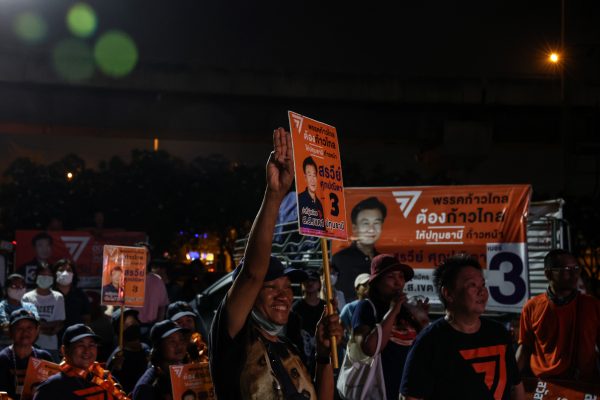Thailand has experienced 14 successful coups carried out by the military, which enjoys almost complete legal impunity. In 2023, Thai democracy remains fundamentally flawed. Indeed, an ’iron triangle’ comprising members of the Election Commission, which oversees elections, judges of the Constitutional Court, which interprets constitutional law, and senators, who can participate in selecting the prime minister, were appointed by the 2014–2019 junta. Many Thais despondently think that stacked ‘independent’ bodies will ‘coup’ the election away from voters via party dissolutions.
Two of the parties competing in the 2023 election are pro-junta proxies of retired generals — Palang Pracharat, led by Deputy Prime Minister Prawit Wongsuwan, and the arch-royalist Ruam Thai Sang Chart, led by Prime Minister Prayut Chan-o-cha. Prawit is a political opportunist dealmaker willing to negotiate with Thaksin. Prayut is an arch-royalist much closer to Thailand’s former queen than the current king and will not cooperate with Thaksin.
Meanwhile, the king is omnipotent in Thailand. He enjoys impunity under Thai law and is indirectly able to choose the senior leadership of the military and police. Any new government must be endorsed by him. Given his authority over the political system, parties considered arch-royalist might have a better chance of being favoured by the palace and its loyalists.
While other mid-sized parties, including the Democrat Party and Bhumjaithai Party, were part of the post-2019 pro-military government, the large Pheu Thai and mid-sized Move Forward are the only progressive parties competing in the 2023 poll sizeable enough to build a coalition.
But the Election Commission could deprive these parties of victory, as happened in the 2019 election. In the 2019 poll, Pheu Thai initially formed a coalition of 255 seats out of 500 — a majority worthy of governing. Only days later, the Election Commission announced a change in the interpretation of party list calculations, leaving the Pheu Thai-led coalition with 245 seats out of 500. The pro-military Palang Pracharat was then able to form a ruling coalition.
Another possibility is that the royalist Constitutional Court could stage a judicial ‘coup’ by dissolving parties, as it did in 2007 and 2020. Among the alleged violations already being bandied are that some banned politicians publicly spoke at rallies for Pheu Thai or Move Forward. Among other charges against Pheu Thai are that it illegally promised to give voters assets. Allegations about illegal donations have also been made against Bhumjai Thai and Palang Pracharat.
The complaints are currently making their way up to the Constitutional Court. If the Court dissolves a party, its executives lose their status as MPs and are banned from politics for 10 years. Non-executive MPs could move to another party. But immediately following an election, these MPs might not be seated in the lower house, which could affect the electoral outcome.
It is telling that the major dissolution cases are targeting the highly popular non-government parties — the fence-sitting Bhumjaithai and Prawit’s Palang Pracharat. There is only a minor case against Prayut’s party. The royalist Democrats — some of whom oppose junta-affiliated parties Palang Pracharat and Ruam Thai Sang Chart — have yet to face any charges. Pheu Thai has anticipated its possible destruction and stated that its dissolution will disenfranchise voters, harm democracy and lead to a new round in Thailand’s political crisis.
But if Pheu Thai and Move Forward win enough seats, their dissolution could lead to massive anti-government demonstrations. In response, the king may endorse a coup, which would be carried out by army commander General Narongphan Jitkaewthae, who is closer to the king than Prayut. Senior palace advisor and ex-army chief Apirat Kongsompong would likely become the appointed prime minister.
If the 2019 election offers another lesson, a safer form of insurance might be to manoeuvre away from upsetting the status quo. Following the election, Pheu Thai could either join the parliamentary opposition or a ruling coalition under Bhumjai Thai or Prawit’s party. Given its history of deal-making, Pheu Thai might accept this path. Because Move Forward would prioritise maintaining its pro-democratic image by remaining in the opposition rather than working with pro-military parties, it is the party most likely to be dissolved like its predecessor Future Forward.
In the run-up to the 14 May election, democratic competition between parties and candidates has superficially appeared strong. But as in 2019, it is in Thailand’s post-election period when the arch-royalist institutions may intervene. If another judicial coup happens in 2023, Thailand could soon find itself with another military-affiliated prime minister. A second straight undemocratic election will intensify the frustration among Thais seeking major political changes.
Dr Paul Chambers is Lecturer at the Centre of ASEAN Community Studies, Naresuan University, Thailand, and has published extensively on military affairs in Southeast Asia. He is also co-author with Napisa Waitoolkiat of Khaki Capital: The Political Economy of the Military in Southeast Asia.

